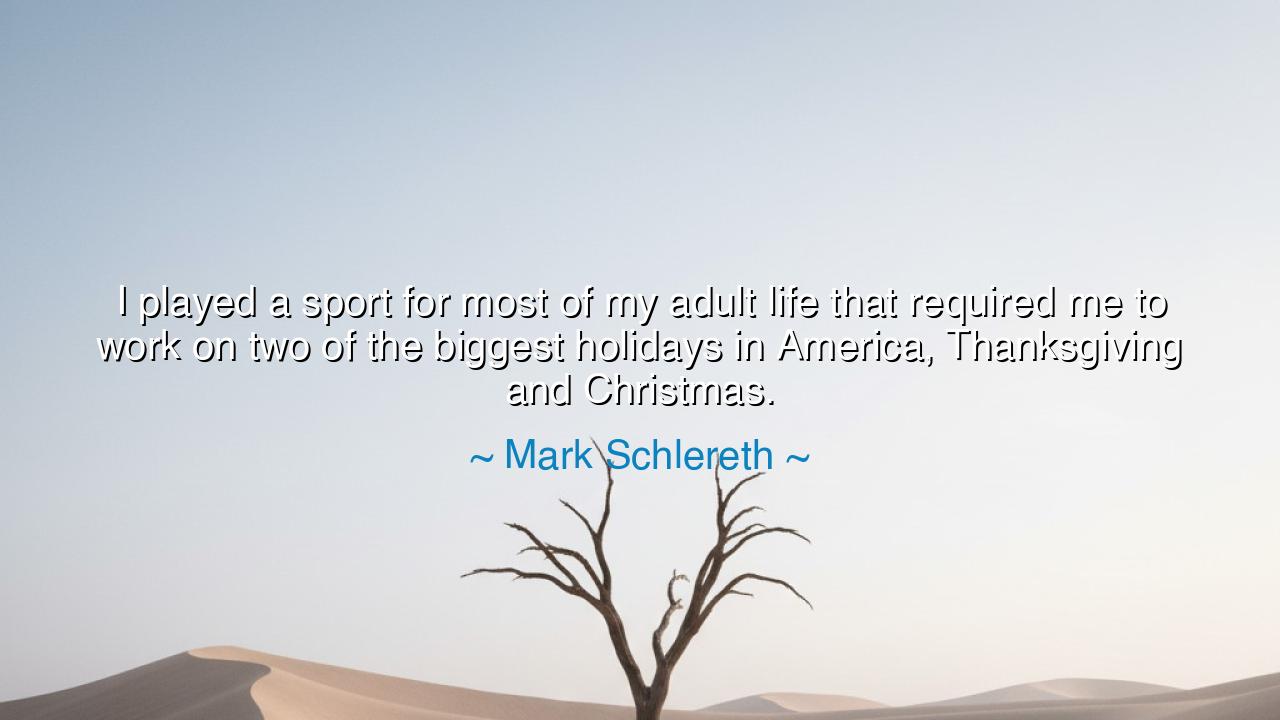
I played a sport for most of my adult life that required me to
I played a sport for most of my adult life that required me to work on two of the biggest holidays in America, Thanksgiving and Christmas.






In the words of Mark Schlereth: “I played a sport for most of my adult life that required me to work on two of the biggest holidays in America, Thanksgiving and Christmas.” At first glance, these words seem but a remembrance of an athlete’s career, yet beneath them lies a truth far greater: that sacrifice often walks hand in hand with honor, and that the path of devotion is seldom free from hardship. For to labor while others feast, to strive while others rest, is the mark of those who give themselves wholly to their calling.
The ancients knew this deeply. Warriors stood guard while villages celebrated, watchmen lit their torches while towns slept in safety, and sailors rowed through storms while their homeland feasted. To play a sport at the highest level is not only to chase glory but also to accept duty, even when that duty denies you the comforts of hearth and home. Schlereth’s words are not words of regret, but of acknowledgment—that every crown has its weight, and every victory its cost.
Consider the story of the Roman gladiators. Though their contests were cruel, they, too, labored on days of festival. While citizens rejoiced in spectacle, it was the gladiator who bore the pain, the risk, and the toil. Their struggle, though violent, reveals a universal truth: that entertainment, triumph, and celebration often rest upon the sacrifices of those who give their labor so others may rejoice. In Schlereth’s case, the fields of football replaced the arenas of Rome, yet the principle remained—the sacrifice of the few became the joy of the many.
But let us not think only of athletes. The same sacrifice is borne by soldiers stationed far from home, doctors and nurses who tend the sick on sacred days, and workers who keep the fires of society burning while others sit at tables of feasting. Their service is often unnoticed, their absence felt only by loved ones waiting at empty chairs. And yet, like Schlereth, they teach us that duty does not sleep, and that greatness demands surrender.
His mention of Thanksgiving and Christmas is not accidental. These are times meant for family, warmth, and togetherness—times when absence cuts the deepest. To miss them is no small thing, yet to accept their loss for the sake of one’s calling is a sacrifice that reveals strength of character. It is a reminder that to pursue mastery, to serve a higher purpose, or to uphold responsibility, one must sometimes walk the lonelier path.
The lesson is clear: do not envy the triumphs of others without recognizing the price they have paid. Every victory, every accolade, carries behind it unseen sacrifices, missed moments, and personal costs. If you are called to greatness, accept not only its rewards but also its burdens. If others in your life bear such burdens—family, friends, or strangers—honor them, for their sacrifices often grant joy to many.
Practical action is within reach: when you celebrate, remember those who labor unseen. Speak gratitude to the nurse, the soldier, the worker, the athlete, who spends their holidays in service. And in your own life, count the cost of your calling, but bear it with dignity if it serves a greater good. Let your sacrifice not be bitter, but noble, for in giving up what is dear, you may gain what is eternal: purpose, legacy, and honor.
Thus, Schlereth’s words remind us that life’s most meaningful pursuits demand more than talent—they demand sacrifice. The feasts of Thanksgiving and the joy of Christmas are made possible not only by those who sit at the table, but by those who stand apart, working, striving, and giving. And in this truth we learn: to serve faithfully, even at the cost of comfort, is to live heroically.






AAdministratorAdministrator
Welcome, honored guests. Please leave a comment, we will respond soon